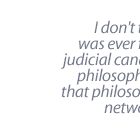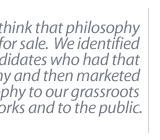






 | 
 |  |  Ross is a lobbyist for the Texas Medical Association.
Ross is a lobbyist for the Texas Medical Association.
 |  |  |
You say politics in this state is a full contact sport. Some people in
other states understand this when you're talking about congressmen or state
legislators, but they understand it a lot less when you're campaigning to take
control of a court. Were there any sort of second thoughts?
It is different in Texas because even to this day I think the voters prefer to
elect just about everything they can elect rather than have it appointed. . .
There's very few among us that have now fought these wars that know this arms
race should stop, should have never started, but that was the basis upon which
this fight had to occur cause it wasn't going to occur at the court house . . .
There's got to be a smarter way of doing this. At a minimum this, these
elections should not be partisan. A merit retention type of a system probably
would be more insular without creating the kinds of politics that occur like in
a purely appointive system, where the politics are still there but they're just
backdoor and behind closed doors.

So at this stage of the game you're thinking that a merit system would be
better here?
We've routinely had those conversations, and I think you would find the more
thoughtful people on both sides of the docket would agree with that. The
difficulty is getting a consensus when this issue cuts across so many axes. . .
So it has historically now for six to eight years running has simply run
aground because it never quite gets that balance.

We interviewed John Hill, former chief justice of the Supreme court--lawyer
now, makes a lot of big contributions to campaigns. But, at the same time,
he's saying this system is terrible. He thinks that there's a chance in the
next couple of years that actually the legislature might be compelled to change
from an election system to a merit selection system. Do you think that's a
pipe dream?
We tend to share Mr. Hill's optimism, but in politics which is reactive by
nature you have to wait for the plane to crash before you can talk about
aircraft safety. And we've been warning about a negative glide path for
several years now. Every member of the court has asked about it and has
championed this cause to some degree or another. . . There are very thoughtful
people in the legislature on both side of the aisle that know that we're
running out of time to do it right . . .

This total change in the court from a decade ago where everyone was a
Democrat on the state supreme court to today where they're all
Republicans--that's an epic change. How important were you, the Texas Medical
Association, in that change?
 |
 |  We have a motto that we may be wrong sometimes, but we're never in doubt. And,
in this circumstance, I would feel like that we were the original catalyst in
this challenge. . . There was a period of nearly ten years where the court was
dominated by plaintiffs' attorneys or those sympathetic with that point of
view. They pretty much ran with a political agenda. And in our case
systematically dismantled in about four years virtually every law governing
medical liability plus they invented a number of new legal duties and new
theories of recovery. As a consequence losses or claims paid out in Texas were
doubling every two and a half years. . . It required, I guess, a crisis in that
regard to finally galvanize medical opinion. . . We aggressively organized
physicians andphysician allies across the state to challenge the members of the
court that we thought best represented the judicial activism and that sort of a
legislative agenda. . . As luck would have it, a court that ordinarily turns
over slowly with three members up on a nine member court every two years, we
have through a series of resignations over half of the court up in a single
year: 1988. And that was the beginning of, of what became a very aggressive
grass roots campaign called "Clean Slate '88." And in that series of races we
won five out of six seats. . . In every election since then we've had either
100% or two out of three type of a batting average. . .
We have a motto that we may be wrong sometimes, but we're never in doubt. And,
in this circumstance, I would feel like that we were the original catalyst in
this challenge. . . There was a period of nearly ten years where the court was
dominated by plaintiffs' attorneys or those sympathetic with that point of
view. They pretty much ran with a political agenda. And in our case
systematically dismantled in about four years virtually every law governing
medical liability plus they invented a number of new legal duties and new
theories of recovery. As a consequence losses or claims paid out in Texas were
doubling every two and a half years. . . It required, I guess, a crisis in that
regard to finally galvanize medical opinion. . . We aggressively organized
physicians andphysician allies across the state to challenge the members of the
court that we thought best represented the judicial activism and that sort of a
legislative agenda. . . As luck would have it, a court that ordinarily turns
over slowly with three members up on a nine member court every two years, we
have through a series of resignations over half of the court up in a single
year: 1988. And that was the beginning of, of what became a very aggressive
grass roots campaign called "Clean Slate '88." And in that series of races we
won five out of six seats. . . In every election since then we've had either
100% or two out of three type of a batting average. . .

You guys put togethervoter slates. These cards are sitting around in a
doctor's office maybe, or the doctor has a conversation with the patient and
says, "Look, I'm supporting this group for the supreme court."
We had extensive reviews and briefings on the candidates themselves in
evaluating them. You know, How do you judge a judge? When you're a doctor,
you can't interview them, ask them how they're going to vote. But we would
bring them in and interview them and ask them about their judicial philosophy.
We look at their pedigree. We'd talk to attorneys that have practiced before
them . . .We held what were briefings with the physicians around the state.
More like rallies and where we presented him with a package. Basically it
included--here is a letter that you could write to your colleagues, to your
employees. Here's an ad you can draw up in the local newspaper, that you would
sign that would talk about the importance of this. . .

So you succeeded within the system, but you still don't like it very
much?
There's not a member of the [Texas state supreme] court that would not parade
up Congress avenue in drag if they thought that would get everybody's attention
to change the system. Most judges hate the system and we know these judges
relatively well because you get to know people on the campaign trail. . . They
see that this drags them into a kind of political debate for which judges
should be relatively insulated from to begin with. . . It's a system designed
some day to fail, and needs to be remedied.

But your representing doctors. If you face a court that's making in your
view bad judgments against you that are hurting your constituency, your job is
to go after that court.
I can't vacate the field just because I don't like the rules. And if those
are the rules we're going to play by them and exploit them to the extent that
we can, as will our adversaries. . . It's a zero sum game. If I vacate the
field, others will fill it and we won't necessarily like that result either. .
.

There is a criticism of this court which I know you are very familiar with
which has come from several sort of consumer public interest groups here. And
that criticism is basically that your association, business associations have
bought if not cases on, decisions, individual decisions, a philosophy on the
court.
I don't think that philosophy was ever for sale. We identified judicial
candidates who had that philosophy and then marketed that philosophy to our
grassroots networks and to the public. And I would counter to say that the
other side has their judicial philosophy and they are not lacking in resources.
. . They can take that same case to the court public opinion and challenge
those judges on that basis and see how they do. . .

Tell me about trial lawyers in this state. You guys are burying the
hatchet?
Some have accused us of being in bed with them and, if we were, it was twin
beds. . . We think it is very important because you should be crafting public
policy in a political environment with as much thought as possible when it
involves peoples' individual rights. And these should not be resolved solely
on the basis of who can get the most votes, and who can run over the other side
with the best rhetoric or the best oiled political machinery, because we enjoy
that advantage now. But those things ebb and flow. And that's not how policy
should be set. We initiated years ago an offer of detente and we're blessed
with the fact that among their leaders were some very thoughtful individuals. .
.

Now some people have told us that one of the reasons that the election money
seems to have peaked, and now gone down, is that you and others were so
successful that basically the trial attorneys and the labor unions, the other
side have given up on judicial races.
I think they've determined it's a wasted effort. This is a court that's very
difficult to criticize. They are doing a good job. They're getting good
reviews from both sides of the bar. . . That doesn't mean that they fold up
their tent and gone home. That means they've moved to other jurisdictions.
You'll find them very active in certain appellate districts and in certain
local district courts. There are fourteen appellate districts. They're in
about six or seven of them. And there are 411 district courts and they're
probably in at least a third to half of those actively still working those
cases and working those kinds of campaigns. So it just, it just moves around.
. .

In this sort of epic battle that Texas has had over this past decade--and
you being one of the big players in that battle--to what extent has this been
exported to other states?
I've been in at least a dozen, two dozen states, where they're in an earlier
evolutionary stage of these kind of battles. There are predictably about four
phases. You start with a big fight in the legislature to pass tort laws that
limit liability in some form, fairly comprehensive in nature. From that it
goes to the court system and the courts eventually dismantle parts or all of
those depending on how well they've been crafted. . . Then in the third phase
is the backlash effect of then challenging those judges, and trying to replace
them with more conservative judges. And then the final phase is one where once
the dog has caught the car, how do you drive it? You have become that which
you sought to replace. We're in the dog caught the car phase where we're
looking at acourt that's well-regarded and doing well, but you're now in the
governing mode as opposed to the challenging mode. You will see states now in
the Midwest that are just starting that: Ohio, Illinois, others that have had
their big tort battles and now are leading into judicial battles. . . They will
look at our slate card efforts, our coalition efforts, learn from our mistakes,
capitalize on things that we did well. . . I think you'll see it go through
those very predictable phases and at some point then they'll get to the stage
where they say, "We've got to stop the arms race." They're just not quite there
yet and we are.

home ·
how bad is it? ·
what's happening in my state? ·
how did we come to elect judges?
how should judges be selected? ·
video ·
quiz
discussion ·
links ·
synopsis ·
press ·
tapes ·
funding ·
teachers' guide
frontline ·
pbs online ·
wgbh
some images copyright © 1999 photodisc all rights reserved
web site copyright WGBH educational foundation
|